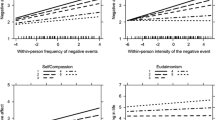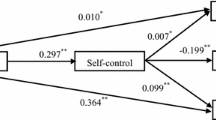Abstract
Self-serving attributional bias (SSAB) is defined as the tendency of individuals to make more internal, stable, and global attributions for positive than for negative events. One of the objectives of the current study was to examine the presence and magnitude of SSAB in two undergraduate women samples from Denmark and Spain. SSAB has been inversely associated with psychological distress. However, well-being is not merely the absence of psychological distress. Therefore, positive affect balance and life satisfaction, as components of subjective well-being (SWB), were considered with the aim to explore how SSAB and SWB are related. The results showed that both Danish and Spanish women displayed SSAB. While this bias was greater for the Spanish group than for the Danish one, Danish women reported a more positive affect balance and greater life satisfaction than Spanish women. SSAB and the two components of SWB were interrelated in both samples, and mediational analysis showed that positive affect balance mediated the relationships between SSAB and life satisfaction. The joint study of SSAB and other relevant factors which also influence well-being, in order to know the relative contribution of each of them, would be necessary. Likewise, it also suggested that differences on well-being between analyzed samples can be explained, at least in part, by socioeconomic differences in both countries.
Access this chapter
Tax calculation will be finalised at checkout
Purchases are for personal use only
Similar content being viewed by others
References
Alloy, L. B., Just, N., & Panzarella, C. (1997). Attributional style, daily life events, and hopelessness depression: Subtype validation by prospective variability and specificity of symptoms. Cognitive Therapy and Research, 21, 321–344.
Anderson, C. (1999). Attributional style, depression, and loneliness: A cross-cultural comparison of American and Chinese students. Personality and Social Psychology Bulletin, 25, 482–499.
Baron, R., & Kenny, D. (1986). The moderator-mediator variable distinction in social psychological research: Conceptual, strategic, and statistical considerations. Journal of Personality and Social Psychology, 51, 1173–1182.
Baumeister, R. F. (1998). The self. In D. T. Gilbert, S. T. Fiske, & G. Lindzey (Eds.), The handbook of social psychology (pp. 680–740). New York: McGraw-Hill.
Biswas-Diener, R. (2008). Material wealth and subjective well-being. In M. E. Eid & R. J. Larsen (Eds.), The science of subjective well-being (pp. 307–322). New York: Guilford Press.
Biswas-Diener, R., Vittersø, J., & Diener, E. (2010). The Danish effect: Beginning to explain high well-being in Denmark. Social Indicator Research, 97, 229–246.
Cabañero, M. J., Richart, M., Cabrero, J., Orts, M. I., Reig, A., & Tosal, B. (2004). Reliability and validity of Diener’s satisfaction with life scale in a simple of pregnant women and new mothers. Psicothema, 16(3), 448–455.
Campbell, K., & Sedikies, C. (1999). Self-threat magnifies the self-serving bias: A meta-analytic integration. Review of General Psychology, 3, 23–43.
Church, A. T. (2000). Culture and personality: Toward an integrated cultural trait psychology. Journal of Personality, 68, 651–703.
Cross, S. E., & Markus, H. R. (1999). The cultural constitution of personality. In L. A. Pervin & O. P. John (Eds.), Handbook of personality: Theory and research (pp. 378–396). New York: Guilford Press.
Jensen de López, K. (2010). Adaptations of attributional style questionnaire, positive and negative schedule, and satisfaction with life scale in Danish people. Manuscript in preparation. Aalborg University, Aalborg, Denmark.
Deaton, A. (2008). Income, health, and well-being around the world: Evidence from the Gallup World Poll. Journal of Economic Perspectives, 22, 53–72.
Deneve, K., & Cooper, H. (1998). The happy personality: A meta-analysis of 137 personality traits and subjective well-being. Psychological Bulletin, 124, 197–229.
Diener, E. (2000). Subjective well-being. The science of happiness and proposal for a national index. American Psychologist, 55, 34–43.
Diener, E., & Biswas-Diener, R. (2002). Will money increase subjective well-being? Social Indicators Research, 57, 119–169.
Diener, E., Diener, M., & Diener, C. (1995). Factors predicting the subjective well-being of nations. Journal of Personality and Social Psychology, 69, 851–864.
Diener, E., Suh, E. M., Lucas, R. E., & Smith, H. L. (1999). Subjective well-being: Three decades of progress. Psychological Bulletin, 125, 276–302.
Diener, E., Lucas, R., & Oishi, S. (2002). Subjective well-being: The science of happiness and life satisfaction. In C. R. Snyder & S. J. Lopez (Eds.), Handbook of positive psychology (pp. 63–73). New York: Oxford University Press.
Euro-stat. (2008). http://epp.eurostat.ec.europa.eu/portal/page/portal/eurostat/home/
Fresco, D. M., Alloy, L. B., & Reilly-Harrington, N. (2006). Association of attributional style for negative and positive events and the occurrence of life events with depression and anxiety. Journal of Social and Clinical Psychology, 25, 1140–1159.
Hamamura, T., & Heine, S. (2008). The role of self-criticism in self-improvement and face maintenance among Japanese. In E. Chang (Ed.), Self-criticism and self-enhancement: Theory, research, and clinical implications (pp. 105–122). Washington, DC: APA.
Hedges, L. (1981). Distribution theory for Glass’s estimator of effect size and related estimators. Journal of Educational Statistics, 6, 107–128.
Heine, S. (2001). Self as cultural product: An examination of East Asian and North American selves. Journal of Personality, 69, 881–906.
Heine, S. (2005). Where is the evidence for pancultural self-enhancement? A reply to Sedikides, Gaertner, & Toguchi (2003). Journal of Personality and Social Psychology, 89, 531–538.
Heine, S., & Hamamura, T. (2007). In search of East Asian self-enhancement. Personality and Social Psychology Review, 11, 4–27.
Heine, S., Lehman, D., Markus, H., & Kitayama, S. (1999). Is there a universal need for positive self-regard? Psychological Review, 106, 766–794.
Keyes, C. (2002). The mental health continuum: From languishing to flourishing in life. Journal of Health and Social Behavior, 43, 207–222.
Kitayama, S., Takagi, H., & Matsumoto, H. (1995). Causal attribution of success and failure: Cultural psychology of the Japanese self. Japanese Psychological Review, 38, 247–280.
Koenig, L. (1997). Depression and the cultural context of the self-serving bias. In U. Neisser & D. Jopling (Eds.), The conceptual self in context: Culture, experience, self-understanding (pp. 62–74). New York: Cambridge University Press.
Kuppens, P., Realo, A., & Diener, E. (2008). The role of positive and negative emotions in life satisfaction judgment across nations. Journal of Personality and Social Psychology, 95, 66–75.
Lucas, R., & Diener, E. (2008). Personality and subjective well-being. In O. John, R. Robins, & L. Pervin (Eds.), Handbook of personality: Theory and research (pp. 795–814). New York: Guilford Press.
Lyubomirsky, S., Sheldon, K., & Schkade, D. (2005). Pursuing happiness: The architecture of sustainable change. Review of General Psychology, 9, 111–131.
Markus, H., & Kitayama, S. (1991). Culture and self: Implications for cognition, emotion, and motivation. Psychological Review, 98, 224–253.
Mezulis, A., Abramson, L. Y., Hyde, J., & Hankin, B. (2004). Is there a universal positivity bias in attributions? A meta-analytic review of individual, developmental, and cultural differences in the self-serving attributional bias. Psychological Bulletin, 130, 711747.
Moore, R., Blackwood, N., Corcoran, R., Rowse, G., Kinderman, P., Bentall, R., & Howard, R. (2006). Misunderstanding the intentions of others: An exploratory study of the cognitive etiology of persecutory delusions in very late-onset schizophrenia-like psychosis. The American Journal of Geriatric Psychiatry, 14(5), 410–418.
Morris, S. (2007). Attributional biases in subclinical depression: A schema-based account. Clinical Psychology & Psychotherapy, 14, 32–47.
Myers, D. G. (2000). The funds, friends, and faith of happy people. American Psychologist, 55, 56–67.
Pavot, W., & Diener, E. (1993). Review of the satisfaction with life scale. Psychological Assessment, 5, 164–172.
Peterson, C., Semmel, A., Baeyer, C., Abramson, L. Y., Metalsky, G. I., & Seligman, M. E. P. (1982). The attributional style questionnaire. Cognitive Therapy and Research, 6, 287–300.
Sandin, B., Chorot, P., Lostao, L., Joiner, T. E., Santed, M. A., & Valiente, R. M. (1999). Positive and negative affect scales (PANAS): Factorial validity and cross-cultural convergence. Psicothema, 11, 37–51.
Sanjuán, P. (2011). Affect balance as mediating variable between effective psychological functioning and satisfaction with life. Journal of Happiness Studies, 12, 373–384.
Sanjuán, P., & Magallares, A. (2006). The relationship between dispositional optimism and attributional style and their predictive power in a longitudinal study. Revista de Psicología General y Aplicada, 59, 71–89.
Sanjuán, P., Fraguas, D., Magallares, A., & Merchán-Naranjo, J. (2009). Depressive symptomatology and attributional style in patients with schizophrenia. Clinical Schizophrenia & Related Psychoses, 3, 31–38.
Schimmack, U., & Diener, E. (1997). Affect intensity: Separating intensity and frequency in repeatedly measured affect. Journal of Personality and Social Psychology, 73, 1313–1329.
Schwarz, N., & Clore, G. (1983). Moos misattribution, and judgments of well-being: Informative and directive functions of affective states. Journal of Personality and Social Psychology, 45, 513–523.
Schwarz, N., & Clore, G. (2007). Feelings and phenomenological experiences. In E. Higgins & A. Kruglanski (Eds.), Social psychology: Handbook of basic principles (pp. 385–407). New York: Guilford Press.
Sedikides, C., Gaertner, L., & Toguchi, Y. (2003). Pancultural self-enhancement. Journal of Personality and Social Psychology, 84, 60–79.
Sedikides, C., Gaertner, L., & Vevea, J. (2005). Pancultural self-enhancement reloaded: A meta-analytic reply to Heine (2005). Journal of Personality and Social Psychology, 89, 539–551.
Sedikides, C., Gaertner, L., & Vevea, J. (2007). Evaluating the evidence for pancultural self-enhancement. Asian Journal of Social Psychology, 10, 201–203.
Sobel, M. (1988). Direct and indirect effects in linear structural equation models. In J. Long (Ed.), Common problem/proper solutions: Avoiding error in quantitative research (pp. 46–64). Beverly Hills: Sage.
Sweeney, P. D., Anderson, K., & Bailey, S. (1986). Attributional style in depression: A meta-analytic review. Journal of Personality and Social Psychology, 50, 974–991.
Triandis, H. C. (2000). Culture and conflict. International Journal of Psychology, 35, 145–152.
Triandis, H. C. (2001). Individualism-collectivism and personality. Journal of Personality, 69, 907–924.
Wallbridge, H. (1997). Self-enhancing illusion and mental health: A longitudinal panel latent-variable structural equation model. Dissertation Abstract International, 57(10-B), 6638.
Watson, D., Clark, L. A., & Tellegen, A. (1988). Development and validation of brief measures of positive and negative affect. The PANAS scales. Journal of Personality and Social Psychology, 54, 1063–1070.
Author information
Authors and Affiliations
Corresponding author
Editor information
Editors and Affiliations
Rights and permissions
Copyright information
© 2013 Springer Science+Business Media Dordrecht
About this chapter
Cite this chapter
Sanjuán, P., de Lopez, K.J. (2013). Relationships Between Self-Serving Attributional Bias and Subjective Well-Being Among Danish and Spanish Women. In: Knoop, H., Delle Fave, A. (eds) Well-Being and Cultures. Cross-Cultural Advancements in Positive Psychology, vol 3. Springer, Dordrecht. https://doi.org/10.1007/978-94-007-4611-4_12
Download citation
DOI: https://doi.org/10.1007/978-94-007-4611-4_12
Published:
Publisher Name: Springer, Dordrecht
Print ISBN: 978-94-007-4610-7
Online ISBN: 978-94-007-4611-4
eBook Packages: Behavioral ScienceBehavioral Science and Psychology (R0)




